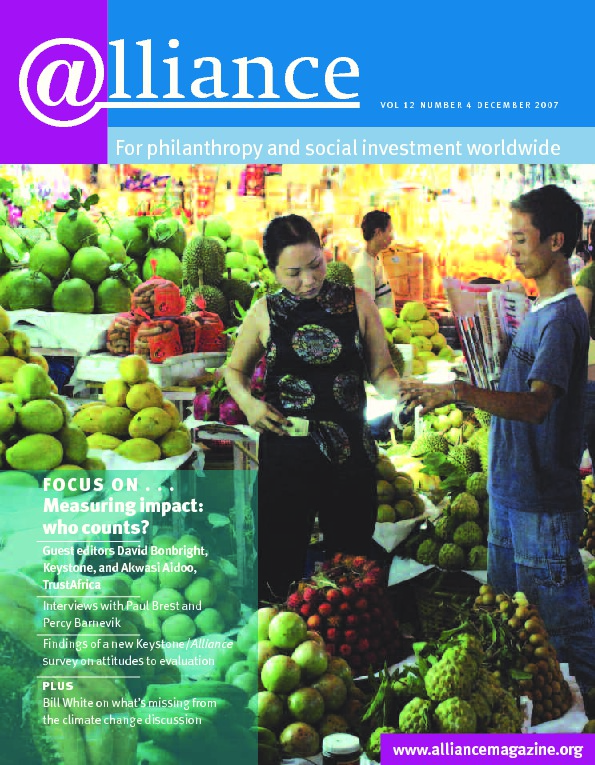The Sustainable Food Lab is a consortium of business and civil society leaders from around the globe whose aim is to accelerate the shift of sustainable food from niche to mainstream. Our members include some of the largest food companies (eg General Mills, Unilever, US Foodservice) and some of the most effective social and environmental organizations (eg WWF, Oxfam, Rainforest Alliance) in the food and agriculture sector. We see evaluation as a powerful tool both for gauging ultimate impact and for making programmatic improvements along the way.
Food Lab’s work has two main, closely intertwined strands. The first is a number of value chain projects with individual companies on issues like carbon reduction or fair pay for farmers. The second is developing leadership capacity across the food system. We are also developing specific pilot projects to improve aspects of the system; in each case, we are looking for tipping points where small change leads to big change. These projects include partnering rural cooperatives in the Dominican Republic with major buyers to address the issue of economic viability of small-scale farmers and helping major food companies assess and improve the social and environmental performance of their supply chains. Through Food Lab, the large retailer Costco has been able to ask – with full transparency and trust of actors along the supply chain: ‘Do our Guatemalan green bean suppliers receive a fair price? And if not, what would that price be?’
What Food Lab measures
In all of this, evaluation is key to ensuring that our work remains on track.
- We assess our strategies for cultivating the leadership necessary to address the issues of mainstream sustainable food. We do this by listening to participants’ feedback. Food Lab members readily testify to transformations they’ve gone through as a result of their experiences.
- We measure our success in enlisting and expanding stakeholder engagement in improving the food supply. The number of business members has risen from 8 to 17, representing a large and influential portion of the US food industry, while NGO members include some of the most important in the field.
- We assess the extent to which Food Lab business members act on commitments to further sustainability in their supply chains. In December 2006, members of the Sustainable Food Lab Business Coalition issued a Call To Action that articulates the companies’ sense of responsibility for land and people, a definition of sustainability, and a commitment to improvement in both internal operations and supplier criteria. As new companies sign the Call and implement self-assessments, we track their current initiatives and targets for improvement.
Our projects are subject to a number of quantitative and qualitative measures. Among the former are the number of farm workers and family-scale farmers with improved livelihoods; the sales of foods affected by improved standards; and the sales volume of each specific value chain project. Among the qualitative measures we use are the degree to which social goals (well-being of farmers, farm workers and communities) are incorporated into the purchase specifications and practices of buyers; whether models of preferred supplier programmes by major buyers and models of regional distribution are co-designed by the different parties in value chains; and increase in cross-sector leadership abilities among parties involved.
Food Lab uses an external evaluator, JoAnne Berkenkamp. Her approach is to work with programme staff and beneficiaries to continuously refine its focus, objectives and strategies while gathering information on impacts. She attends Food Lab meetings, takes part in many conference calls, and provides an ongoing reflective presence. Using mostly open-ended questions, she elicits feedback from participants about their experience and impressions of Food Lab and whether it works. For individual projects, she collects data and conducts interviews. She also does web-based surveys of Food Lab members after each large-scale meeting. In April this year, for example, a report on one project demonstrated that different sourcing models were having very different impacts, with producers reaping the benefits in some cases and intermediaries in others. Annual reports and intermediate meeting evaluation reports summarize her findings. Staff, the steering committee and other interested parties provide feedback on these reports, all of which informs the way forward.
Daniella Malin works on Communications and Research with Sustainability Institute, the organization that houses the Sustainable Food Lab. Email daniella@sustainer.org
For more information
http://www.sustainer.org





Comments (0)